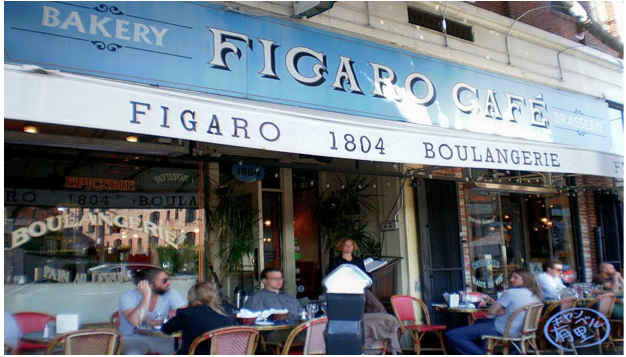CommentsBELL VIEW--I moved to Los Angeles from Chicago in the late-90s. Chicago – or most of it – is much more traditionally “urban” than LA. In fact, when I first came here, LA’s tree-lined streets and single family homes so confused me that I decided to move downtown. At least that part of town felt like a “city.” And I’ve always been a city kid.
At the time, about the only places to walk to in my new neighborhood were Bloom’s General Store and Al’s Bar. Bloom’s sold cigarettes and cereal – pretty much my steady diet at the time – and Al’s was a crazy cave covered in graffiti where you could grab a beer, shoot a game of pool, and maybe watch The Imperial Butt Wizards set fire to the place.
Al’s is gone, and Bloom’s is now a gourmet pie place where a slice of rhubarb and arugula crumble will set you back seven bucks. Clean, bright, happy-looking, beautiful, young urban elites now stroll the same streets where the homeless once pushed shopping carts and urban tumble weeds once rolled. Hipsters nibble on rattlesnake sausages and browse numbingly-precious displays of Japanese origami greeting cards.
Is it better than it was? Sure. I suppose. Don’t get me wrong, I like line-caught yellowfin tuna carpaccio with locally-harvested micro greens and lemon sea foam as much as the next guy. But Al’s is gone. Gone forever. And with it a little bit of what made LA different from anyplace else in the world.
After a year downtown, I dumped my lease and moved to a one bedroom apartment in Los Feliz. Rent set me back $630 a month – which sometimes I could barely scrape out of the couch cushions – and it was in this place I first fell in love with Los Angeles.
And I think I need to make something clear at this point: I don’t love LA; I’m in love with LA. There’s a difference. I love New Orleans, New York City, and the Hollywood Bowl. Whenever I go to these places, I have a swell time. I don’t have any issues, no complaints. But LA drives me crazy most of the time. LA’s like a bi-polar girlfriend with a gambling problem. You never know whether she’s going to scare the crap out of you or take your breath away; and she’ll push your mother down the stairs for a dollar. But don’t anybody else talk smack about her, and don’t tell me she’s not the most beautiful thing you’ve ever seen. That’s what being in love feels like.
When I moved to Los Feliz for the first time, the people in the neighborhood used to think of the place as a “village,” and it fit the bill. The heart of Los Feliz Village in the late 90s was the Onyx Café, where they dealt in bitter coffee, stale muffins, surly cashiers, and real conversation. They stayed open as long as people wanted to keep talking, and they didn’t care if you ever actually bought a cup of coffee. The homeless sat across from film students and talked about Kurosawa. Artists, actors, busboys, novelists, and nurses sat alone or in groups, talked to each other, met each other, had coffee, listened to music, and wandered home together or alone in the blue LA night.
It was a beautiful, real place – a place like no other anywhere – and it’s gone. Gone forever.
Oh the kids these days! They don’t know what they missed. Los Feliz doesn’t feel so much like a village any more. The Onyx is a snooty French café and down the street, ex-frat boys from Michigan with their hats turned backwards chug expensive beer and scream at big-screen TVs. The kids today want housing. In particular, they want density in close proximity to transit. It’s practically a mantra. There’s no denying the law of supply and demand will have a downward pressure on sky-high rents – but will the addition of new housing bring back the days of the $630 one bedroom apartment in Los Feliz?
No. Those deals are as dead and gone as the Hollywood Star Lanes, where the Coen Brothers shot the Big Lebowski, and which was torn down in 2002 to make way for an elementary school.
Is there room in this new Los Angeles for the likes of Al’s Bar, the Onyx, or the Hollywood Star Lanes? Nah. The new LA is slick, and shiny, and looks a lot like a corporate office park without the parking. The old LA – at least this is what we always told ourselves – was arguably the most diverse city in the world. Will the new LA be as diverse? Don’t count on it. The immigrant families who’ve managed to educate their children in rent-controlled apartments in neighborhoods like Echo Park and East Hollywood know the “affordable housing” coming to their neighborhoods has no room for them. Generational stakeholders in Boyle Heights are fighting against the intrusion of art galleries – which they rightly see as the thin edge of the wedge of gentrification. Wait till they get a load of what CIM Group has in store for them.
It’s odd to watch the very young stand up for the rights of billionaires and bankers in their own backyards. I never thought I’d say this, but what is wrong with the kids these days?
(David Bell is a writer, attorney, former president of the East Hollywood Neighborhood Council and writes for CityWatch.) Prepped for CityWatch by Linda Abrams.
Sidebar
Our mission is to promote and facilitate civic engagement and neighborhood empowerment, and to hold area government and its politicians accountable.

 CityWatch Los Angeles
Politics. Perspective. Participation.
CityWatch Los Angeles
Politics. Perspective. Participation.
16
Tue, Dec















